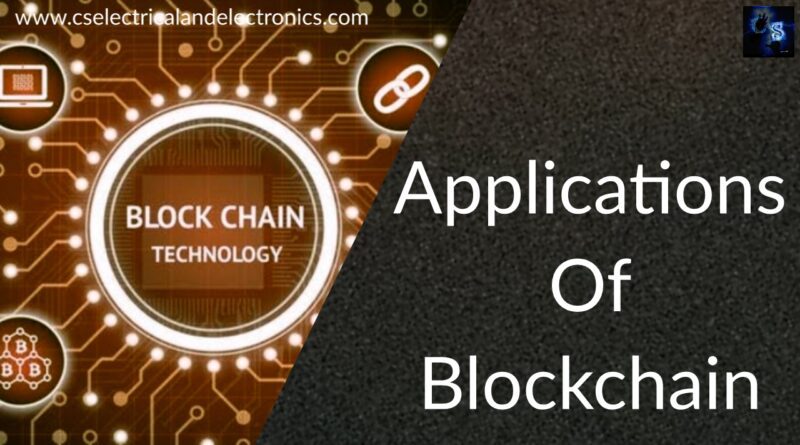Top 10 Applications Of Blockchain In Different Domains, Technology
Hello guys, welcome back to my blog. In this article, I will discuss the top 10 applications of blockchain in different domains, blockchain applications, why blockchain is future technology, etc.
If you have any doubts related to electrical, electronics, and computer science, then ask question. You can also catch me @ Instagram – Chetan Shidling.
Also, read:
- Top 10 Applications Of C++ In Different Domains, Cpp Applications
- Top Free Courses On Stock Market For Beginners, Stock Market Courses
- Top 10 Smart Cities In The World, Best Cities To Visit In The World
Applications Of Blockchain
What is Blockchain?
It is the latest technology where the data is stored in verified, unchangeable, tamper-proof, and immutable ways. In today’s world, the internet is hackable and tempering of data is possible, but these things can be avoided by using blockchain technology.
In the blockchain, once the data is stored it can not be changed again. Blockchain gives us only two options create and read, we can add new data into records and we can read the data.
In other words, blockchain is a technology that is growing rapidly that keeps the permanent record of all the transactions done by us in a secure and immutable way in a decentralized distribution network(means data is stored in many systems).
Applications of blockchain
- It is used in Cryptocurrency (Bitcoin, ethereum, altcoin, litecoin).
- Used in the smart contract (It is handle autonomously the fulfillment of a contract without needing a third party).
- It is also used in digital voting.
- Government registration of land.
- Transportation and supply chain management.
- And in many places where data need to be store permanently.
Read the article: Blockchain Technology, History, Working, Applications, Advantages
Bitcoin and cryptocurrencies are only a small part of what blockchain apps can do. Technology is affecting a wide range of sectors in ways ranging from contract enforcement to government efficiency, thanks to its ability to enhance transparency and fairness while also saving firms time and money.
We’ve compiled a list of 10 real-world blockchain applications for this practical but innovative technology. Although this is by no means a complete list, they are already influencing the way we do business.
01. Money transfers and payment processing
The most natural application of blockchain is to speed up the movement of payments from one party to another. As previously stated, most blockchain transactions may be handled in a couple of seconds because banks are no longer involved and transaction validation takes place 24 hours a day, seven days a week.
02. Monitor supply chains
Blockchain is quite effective in supply chain management. By removing paper-based traces, businesses should be able to quickly spot inefficiencies in their supply chains and locate things in real-time. In addition, blockchain would allow businesses and possibly even customers to track how things fared in terms of quality control as they went from the place of origin to shop.
03. Retail loyalty rewards programs
By becoming the go-to for loyalty benefits, blockchain may further disrupt the shopping experience. It would incentivize customers to return to a certain business or chain to conduct their shopping by developing a token-based system that pays them and storing these tokens on a blockchain. It would also remove the fraud and waste that are frequently connected with loyalty rewards schemes based on paper or cards.
04. Digital IDs
More than a billion individuals throughout the world are struggling with their identities. Microsoft (NASDAQ: MSFT) is attempting to rectify this situation. It’s developing digital IDs for its Authenticator software, which is used by millions of people and gives them control over their digital identities. This would help people in disadvantaged areas to have access to financial services or, for example, establish their own business. Microsoft’s efforts to develop a decentralized digital ID are, of course, still in the early stages.
05. Data sharing
Cryptocurrency IOTA published a beta version of its Data Marketplace in November, demonstrating how blockchain may be used to exchange and sell surplus data. Because most business data is underutilized, blockchain may be used as a middleman to store and transfer this data, benefiting a wide range of industries. Although it is still in its early stages, IOTA has received input from around 35 well-known companies (including Microsoft).
06. Copyright and royalty protection
In a world where everyone has access to the internet, copyright and ownership rules for music and other information have become murky. Copyright regulations for digital material downloads will be considerably enhanced by blockchain, ensuring that the artist or creator of the item being purchased receives a fair portion of the proceeds. The blockchain would also give real-time and transparent royalties distribution data to musicians and content creators.
07. Digital voting
Are you concerned about voter fraud? You won’t have to be concerned anymore thanks to blockchain technology. Although blockchain allows for digital voting, it is transparent enough that any authority may see whether anything on the network has been tampered with. To ensure that your vote is tallied, it combines the convenience of digital voting with the immutability (i.e., immutable nature) of blockchain.
08. Real estate, land, and auto title transfers
One of the main aims of blockchain is to eliminate paper from the mix, as paper trails may be confusing. You’ll need to transfer or acquire a title whether you’re purchasing or selling land, a house, or an automobile. Instead of dealing with this on paper, blockchain may record titles on its network, providing a transparent image of the transfer and a crystal-clear picture of legal ownership.
09. Food safety
Another fascinating application of blockchain may be in tracing food from farm to plate. Because blockchain data is unchangeable, you’d be able to track food items from their source to the shop. Furthermore, in the event of food-borne sickness, blockchain would enable the source of the contamination to be identified much more quickly than it is currently.
10. Immutable data backup
Blockchain might be the ultimate solution for data backup. Although cloud storage solutions are intended to be a one-stop shop for data storage, they are not immune to hacking or infrastructure problems. This problem may be solved by employing blockchain as a backup source for cloud data centers — or any data, as Boeing is studying with its planes’ GPS sensors.
To summarise, blockchain technology has the potential to alter the game. By changing how personal information is stored and how products and services are acquired, it will make life easier and safer. Using blockchain technology, each transaction is recorded in an immutable and permanent way.
This was about ” Applications Of Blockchain “. I hope this article may help you all a lot. Thank you for reading.
Also, read:
- 100+ C Programming Projects With Source Code, Coding Projects Ideas
- 1000+ Interview Questions On Java, Java Interview Questions, Freshers
- App Developers, Skills, Job Profiles, Scope, Companies, Salary
- Applications Of Artificial Intelligence (AI) In Renewable Energy
- Applications Of Artificial Intelligence, AI Applications, What Is AI
- Applications Of Data Structures And Algorithms In The Real World
- Array Operations In Data Structure And Algorithms Using C Programming
- Artificial Intelligence Scope, Companies, Salary, Roles, Jobs
Author Profile
Latest entries
 All PostsOctober 9, 2021What is Image Sensor, Difference Between CCD & CMOS Sensor, Applications
All PostsOctober 9, 2021What is Image Sensor, Difference Between CCD & CMOS Sensor, Applications All PostsOctober 5, 2021Top 15 Food Automation Companies In The World, Food Companies
All PostsOctober 5, 2021Top 15 Food Automation Companies In The World, Food Companies All PostsSeptember 1, 2021What Is Electrical Torque And Mechanical Torque, Definition
All PostsSeptember 1, 2021What Is Electrical Torque And Mechanical Torque, Definition All PostsSeptember 1, 2021Top 10 Gaming Companies in the World, Game Developing Companies
All PostsSeptember 1, 2021Top 10 Gaming Companies in the World, Game Developing Companies








